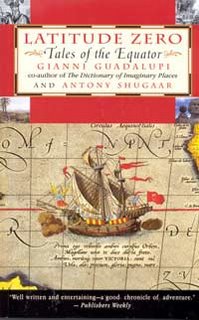 Latitude Zero: Satisfying Armchair Travel Guide
Latitude Zero: Satisfying Armchair Travel GuideLatitude Zero: Tales of the Equator by Gianni Guadalupi, Anthony Shugaar, Carroll & Graf, new York (2001)
This title is a thoroughly enjoyable compendium of equatorial travels sourced by the authors almost entirely from the original accounts and documents of the explorers made famous for their exploits. Thus it is truly an example of how much more wildly entertaining and educational is non-fiction under such unbelievable circumstances as the diaries and meanderings of global explorers often are in the realm of fantastic fiction while honestly, foolheartily gallavanting through pestilence, plague, and the lands of the nyam-nyams more often than not for greedy aims. Their goals were just as often likely attributable to some intrisically valorious purposes such as presuming to measure the Andes mountains or claim this or that mythical lake for a could not care less royal monarch at home.
For obvious reasons, such as heat, scorch, malarial swamps, war-like locals and the odd sea-monster myth, the far reaches of much of the world were left for intrepid Portuguese to discover, perhaps northern tribes of Europe excluding the Vikings really initially preferred to let the flat world belief system keep them home among the ice floes and bitter salt fish. However as the authors note the promise of easy gold pickings among the South Americans drew the most despiciable of first European entrants alone to the field of greed-inspired exploration if early rape and pillage of the realms of the conquistators could really be considered exploration at all even with Raleigh among them. So it is hard to ameliorate the likes of these Southern Europeans with the happy, go-lucky image which the northern tribes attributed their lack of get up and go concerning global trade and exploration. While the English cannot claim Atahualpa on their notches of global conquest, they could explain the likes of Aquitaine and their rather wretched management of the Gascons during The Hundred Years War with similar covetous aims.
So the sections of this title are broken into manageable, digestable morsels to crumb the armchair reader with the diverse characters and stories relating to this man-made zone of demarcation, this proverbial equator of science and geography, which credits Amazons, government surveyors, lovelorn lost wives, and nude German baronesses for adding their acts to the vast play of historical accounting of South American discoveries over the last few centuries. The section on Africa is truly alarming and gives some context to the state of chaos which seems to delicately reign over that continent which must be linked to the actions and activities of explorers like Burton, Speke, Baker, Grant, Henry Morton Stanley and Dr. Livingstone as well as the incessant slave trade recounted of through their stories which repeatedly pitted one opportunistic tribe against another in endless displays of the root of human evil. It seemed then as it often seems now, that exploration was and is always about some purposes imposed from afar on local issues and intrigues which seem to take no account of the people milling around yet another discovery.
The final section of this book is a look at Asian equatorial events including Magellan, Sir James Brooke, Krakatoa and Robert Lewis Stevenson among the Gilbert Islands all written in an engaging and colourful style which gives tribute to these stories with intelligent narrative. It is nice to see them so collected, well drawn and arranged to entice the reader to pick up the book with an interest in short story cycles. There are various means and methods to enjoy this book. Simply turning to a chapter of interest will suffice and by no means would this book require a linear procession from front to back. It makes it much more interesting to read it randomly. Leave straight line learning to those with a real interest in where the equator truly lies. This book re-establishes the realm of the equator in those who sought out its dominion so often at the very cost of their lives, fortunes, and infamy. Latitude Zero holds all to the light of high noon and unwaveringly shares their stories as the present so often improves with such accounts of the past.

No comments:
Post a Comment